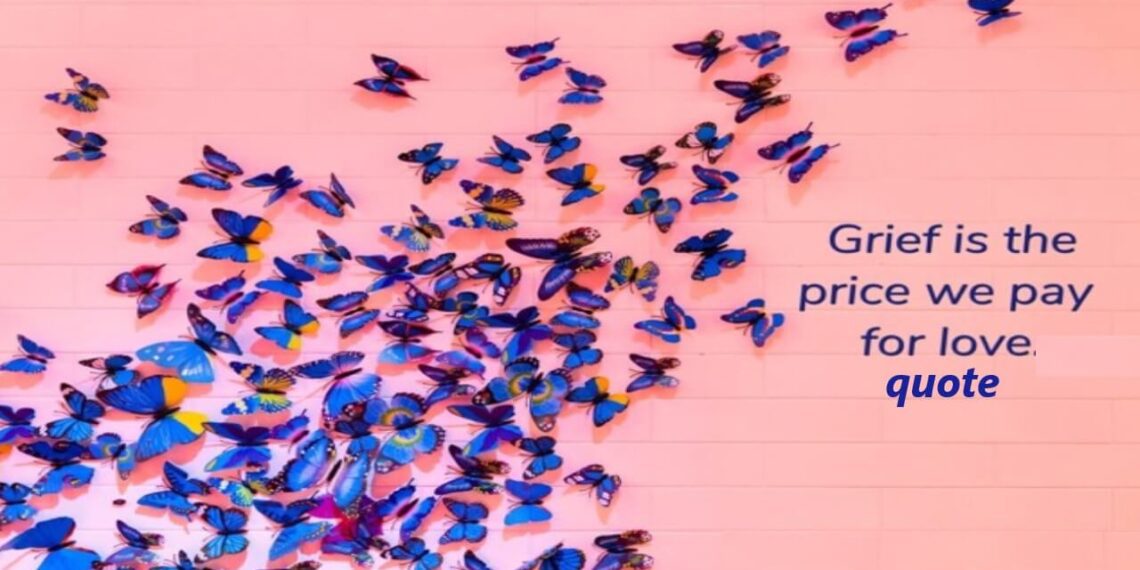One of the most powerful forces we can possess is love. It’s an act of joy, of satisfaction, of connection. But also comes at a cost: disappointment and rejection. The defining phrase for love’s double nature is: “For love, we pay grief. I love that quote – it captures the tragic fact that love and loss are always together. This post will explain what this quote means, its relation to the human condition, and why gaining an understanding of love and grief can be so important to recover from.
What Is The Meaning Of “Grief is the Price We Pay for Love”?
It comes back to that “Grief is the price we pay for love” which boils down to the reality that if we emotionally bond to other people, we are leaving ourselves vulnerable to death. Love bonds are meaningful and we live with those connections. And the more important the love, the more devastated one can be when that love is threatened or lost.
Grief, in this sense, is not just the sadness that comes from losing a loved one; it’s the emotional and psychological price we pay for the gift of love. We can have astonishing happiness and intimacy in love, but at the same time be prone to sadness, yearning and the inescapable suffering of separation: death, separation, separation by break-up, and so on.
The Love/Death Paradox
The irony of love and grief is that they both come at the same time. It is difficult and jarring, but grief is part of the love we have given one another. It tells you how deeply we were enmeshed with someone or something. The more deep the love, the more severe may be the sadness at the end of that relation.
To give one example, say that someone you love has passed away. Sometimes, our pain is uncontrollable, but it is also a result of our loved one’s. We wouldn’t mourn without love. That’s why the weight of this loss is where we see the richness and importance of the relationship we had.
Why Grief Should Come at a Cost We Can’t Avoid
Grief has often been the “trick” we pay for love as it is the part of the human condition we simply cannot afford to be without. Love makes others’ hearts flutter, and the emotion follows as an inescapable consequence when that attachment is broken. Grief is hard, but it also plays a crucial role in healing and development.
- Love Gives Us Meaning and Purpose in Life: Love gives us purpose and joy. Relationships with others are central to our health – be it romantic, familial or friend-based. These are relationships that make us feel seen, known and appreciated. Love is worth losing in this way.
- Healing and Self-Evolving from Grief: Even though grief can be a crushing burden, it is also healing. It’s in grief that we can grieve, reflect on what we are feeling, remember those we cared about, and then come to terms with our loss. And so grief prepares us emotionally and psychologically for a time of loss, when we can build resilience in the midst of loss.
- Grief Makes Us See Things for What They Are: As we grieve, we see that we are important in relationships and life is ephemeral. This can be the thing to make our heads turn, help us see the big picture, and allow ourselves to be in the present with those we love.
What to Do With the Loss that comes with Being in Love?
Grief is an intensely subjective, complicated feeling and not every individual can deal with it the same way. But there are some ways in which one can make sense of grief that comes from love:
- Allow Yourself To Feel: Part of the hardest part about dealing with grief is letting go of your emotions. Keeping your sadness inside or acting as if you aren’t grieving can hold off the recovery process. If you allow yourself to grieve, you will start to grieve and recover.
- Count on Friends and Family: Grief alone is lonely. Friends, family or a support group should be reached in this dark time. Having someone understand what you are feeling and how you feel can be healing and powerful.
- Self-Care: You don’t always have good health after you are grieving. Make sure you are looking after yourself in this period by caring for yourself. Be it with exercise, meditation or just rest, taking care of yourself will make the mourning process easier.
- Be Compassionate About Your Friends and Family: A way to be able to make sense of loss is by remembering the people you love. Whether this was in the form of a monument, stories or perpetuating rituals that meant something to them. Keep them in your thoughts, so you can still find closure from the loss.
Get Professional Support if You Need It: If your grief is too much, or lasts too long, you might need professional help. The therapist or counselor can guide and support you in the grief of loss.
Love, Loss and the Human Condition
What’s at the core of the quote “Grief is the price we pay for love” is the basic truth about being human. ‘Lover and mourner are not two things at all; they are intertwined. We can’t enjoy deep love without the risk of loss. This connection is an affirmation that life is full and relationships are precious.
Grief is sometimes intolerable, but at the same time, it is also the expression of the love we received. It’s an indication of what our relationships mean and how they have shaped us. And that is how we can respond to grief in ways that feel compassionate toward ourselves and others, and know that love is where we seek meaning, purpose and healing.
Conclusion
‘Grace is the price we pay for love.’ I like this saying, because it reminds me of the huge emotional price of loving someone or something. Grief may feel like an inconvenience, but it’s part of being human and part of growing emotionally and recovering from a loss. With love and loss, we can have purpose in our lives, honour our loved ones’ memory, and thrive on being stronger through life.
And love is really worth paying in grief, because it is in love that we live, and in grief that we realise that we can be grateful for our possessions.





